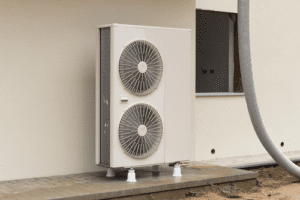For most California residents, life without an air conditioner is practically unimaginable. If you have recently moved into a new home, you’re probably thinking about how to find the best AC for your needs so that you can make yourself comfortable quickly. If that’s the case, maybe you’ve considered the idea of purchasing an AC unit with heat pump included. An AC unit with a heat pump can be particularly useful because they allow you to take care of both heating and cooling with the same appliance. However, specific factors can affect each individual’s use of a heat pump, and it is essential to consider them carefully before you decide to buy one.
What Is an AC Unit with a Heat Pump?
 For those of you who are unfamiliar with the concept of a heat pump, you should learn what it is before reading any further. During the summertime, an air conditioner and a heat pump are functionally the same. Both can cool your home by pressuring or pressurizing refrigerant until it changes states, absorbing, or releasing heat in the process. Air conditioners and heat pumps condition the coolant in their pipes to absorb the heat inside your home during the summer, then transfer it outside and release it into the atmosphere surrounding your home. By doing so, they lower the temperature inside your house.
For those of you who are unfamiliar with the concept of a heat pump, you should learn what it is before reading any further. During the summertime, an air conditioner and a heat pump are functionally the same. Both can cool your home by pressuring or pressurizing refrigerant until it changes states, absorbing, or releasing heat in the process. Air conditioners and heat pumps condition the coolant in their pipes to absorb the heat inside your home during the summer, then transfer it outside and release it into the atmosphere surrounding your home. By doing so, they lower the temperature inside your house.
The significant difference between heat pumps and regular air conditioners is that heat pumps can work backward. They are also capable of absorbing the warm air from outside the house via their refrigerant and transferring that air inside to warm up your home. This might sound like a dream come true for homeowners with limited space, or those who do not want to maintain a furnace in addition to their air conditioning system. However, a feature-by-feature comparison may reveal that heat pumps are better for some homeowners than for others.
Heat Pump Pros and Cons
The following factors should be considered when comparing heat pumps to air conditioners:
- Pro: Heat pumps require less infrastructure because they have two roles
Because heat pumps pull double-duty, they are more compact. This makes them particularly useful in tighter spaces such as mobile homes or bungalows where closet space is precious. You will also be able to save money that would otherwise be used for furnace maintenance and repair. Be aware that heat pumps do require regular professional service and diligent maintenance though, just like any other climate control system.
- Con: Heat pumps have limited effectiveness at unusually cold temperatures
Heat pumps provide heat in residences by drawing it out of the air outside. However, when outdoor temperatures are near or below freezing, there is very little heat that can be extracted from the air in this manner. When this occurs, many heat pumps have to draw upon additional heating mechanisms, generally in the form of miniature electric heating coils. Relying on these for adequate heat during a frigid winter may be less cost-effective than using a furnace.
- Pro: Heat pumps cut down on long-term heating and cooling costs
If you live in a balanced climate, heat pumps are usually more efficient than using a separate air conditioner and furnace to control the temperature in your home. You can expect to see your monthly utility bills cut down a little once you begin to use a heat pump instead.
- Con: Heat pumps are more expensive to purchase up front
The convenience and long-term savings offered by a heat pump come at a cost, quite literally in fact. The national average in the United States is $5438 for 2018, including the installation costs. Over time, the heat pump will likely pay itself off, as long as you rely on skilled technicians to perform service and repairs. However, the initial cost of the equipment itself and subsequent installation can prove prohibitive for some would-be buyers.
When Should You Buy a Heat Pump?
Based on the above, here are the best circumstances under which to purchase a heat pump for your home: firstly, a heat pump can be an excellent investment if the entire heating and cooling system in your home already needs to be replaced. In these cases, purchasing and maintaining a heat pump can be less expensive than buying separate furnaces and air conditioners, then paying for the installation of both. In other cases, it may be cheaper and more efficient to continue using your air conditioner and furnace with regular service from a licensed technician.
Understanding what an AC unit with a heat pump can do for you (and what it cannot) will help you decide whether to use this technology for yourself or not. Weigh the pros and cons carefully, then choose the option that suits your home and needs best.
Check with us here at Valley Comfort Heating and Air, our customers love our attention to detail and our friendly, affordable service. (707) 539-4533
